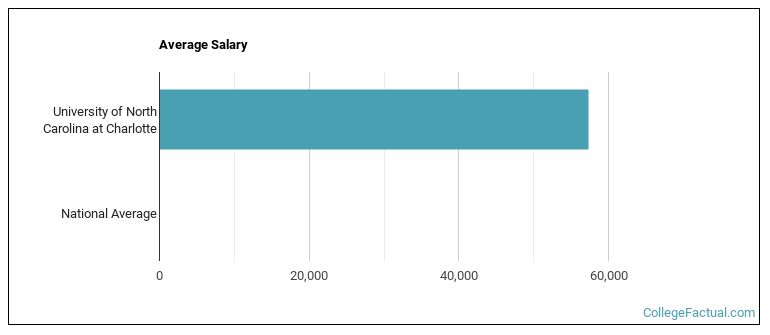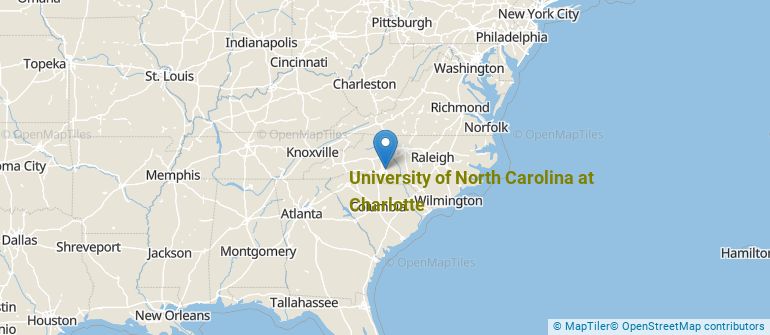 by our College Data Analytics Team
by our College Data Analytics Team
In its yearly rankings, College Factual analyzes over 2,000 colleges and universities to determine which ones are the best in a variety of categories, such as overall value, quality, diversity, which schools are the best for each major, and much more.
University of North Carolina at Charlotte was awarded 124 badges in the 2025 rankings. The highest ranked major at the school is special education.
Explore the best ranked schools for the programs you are most interested in.
According to College Factual's 2025 analysis, UNC Charlotte is ranked #367 out of 2,152 schools in the nation that were analyzed for overall quality. This puts it in the top 20% of all schools in the nation. This is an improvement over the previous year, when UNC Charlotte held the #378 spot on the Best Overall Colleges list.
UNC Charlotte is also ranked #10 out of 93 schools in North Carolina.
See all of the rankings for University of North Carolina at Charlotte.
When it comes to admittance, University of North Carolina at Charlotte is somewhat selective. Its acceptance rate is 80%, which means you'll face some strong competition during the admissions process. Do what you can to make your application stand out.
About 31% of students accepted to UNC Charlotte submitted their SAT scores. When looking at the 25th through the 75th percentile, SAT Evidence-Based Reading and Writing scores ranged between 540 and 640. Math scores were between 530 and 650.
Learn more about University of North Carolina at Charlotte admissions.
The student to faculty ratio at University of North Carolina at Charlotte is 20 to 1, which is high when compared to the national average of 15 to 1. This may indicate that some of your classes will be larger in size than they would be at other schools. However, upper level classes will probably be smaller.
When estimating how much access students will have to their teachers, some people like to look at what percentage of faculty members are full time. This is because part-time teachers may not have as much time to spend on campus as their full-time counterparts.
The full-time faculty percentage at University of North Carolina at Charlotte is 71%. This is higher than the national average of 47%.
The freshmen retention rate of 84% tells us that most first-year, full-time students like University of North Carolina at Charlotte enough to come back for another year. This is a fair bit higher than the national average of 68%. That's certainly something to check off in the good column about the school.
The on-time graduation rate is the percent of first-time, full-time students who get their bachelor's degree with four years. At UNC Charlotte this rate is 38%, which is about average when compared to the national rate of 33.3%.
Find out more about the retention and graduation rates at University of North Carolina at Charlotte.
During the 2017-2018 academic year, there were 24,175 undergraduates at UNC Charlotte with 21,104 being full-time and 3,071 being part-time.
| $0-30 K | $30K-48K | $48-75 | $75-110K | $110K + |
|---|---|---|---|---|
| $9,638 | $11,212 | $14,829 | $18,716 | $20,852 |
The net price is calculated by adding tuition, room, board and other costs and subtracting financial aid.Note that the net price is typically less than the published for a school. For more information on the sticker price of UNC Charlotte, see our tuition and fees and room and board pages.
While almost two-thirds of students nationwide take out loans to pay for college, the percentage may be quite different for the school you plan on attending. At UNC Charlotte, approximately 50% of students took out student loans averaging $7,127 a year. That adds up to $28,508 over four years for those students.
The student loan default rate at UNC Charlotte is 1.0%. This is significantly lower than the national default rate of 10.1%, which is a good sign that you'll be able to pay back your student loans.
Get more details about paying for University of North Carolina at Charlotte.

See which majors at University of North Carolina at Charlotte make the most money.
Get more details about the location of University of North Carolina at Charlotte.

Contact details for UNC Charlotte are given below.
| Contact Details | |
|---|---|
| Address: | 9201 University City Blvd, Charlotte, NC 28223-0001 |
| Phone: | 704-687-2000 |
| Website: | https://www.charlotte.edu/ |
| Most Popular Majors | Bachelor’s Degrees | Average Salary of Graduates |
|---|---|---|
| Computer Science | 784 | $67,704 |
| Teacher Education Grade Specific | 604 | $42,789 |
| Business Administration & Management | 423 | $46,272 |
| General Psychology | 405 | $30,359 |
| Health & Medical Administrative Services | 383 | $36,749 |
| Finance & Financial Management | 380 | $51,628 |
| Communication & Media Studies | 321 | $38,234 |
| General Biology | 291 | $34,094 |
| Criminal Justice & Corrections | 260 | $36,155 |
| Nursing | 236 | $73,445 |
Online courses area a great option for busy, working students as well as for those who have scheduling conflicts and want to study on their own time. As time goes by, expect to see more and more online learning options become available.
In 2022-2023, 16,677 students took at least one online class at University of North Carolina at Charlotte. This is a decrease from the 20,859 students who took online classes the previous year.
| Year | Took at Least One Online Class | Took All Classes Online |
|---|---|---|
| 2022-2023 | 16,677 | 3,111 |
| 2021-2022 | 20,859 | 4,225 |
| 2020-2021 | 28,152 | 8,056 |
| 2018-2019 | 8,108 | 1,414 |
Learn more about online learning at University of North Carolina at Charlotte.
If you’re considering University of North Carolina at Charlotte, here are some more schools you may be interested in knowing more about.
Curious on how these schools stack up against UNC Charlotte? Pit them head to head with College Combat, our free interactive tool that lets you compare college on the features that matter most to you!
Footnotes
*The racial-ethnic minorities count is calculated by taking the total number of students and subtracting white students, international students, and students whose race/ethnicity was unknown. This number is then divided by the total number of students at the school to obtain the racial-ethnic minorities percentage.
References
More about our data sources and methodologies.